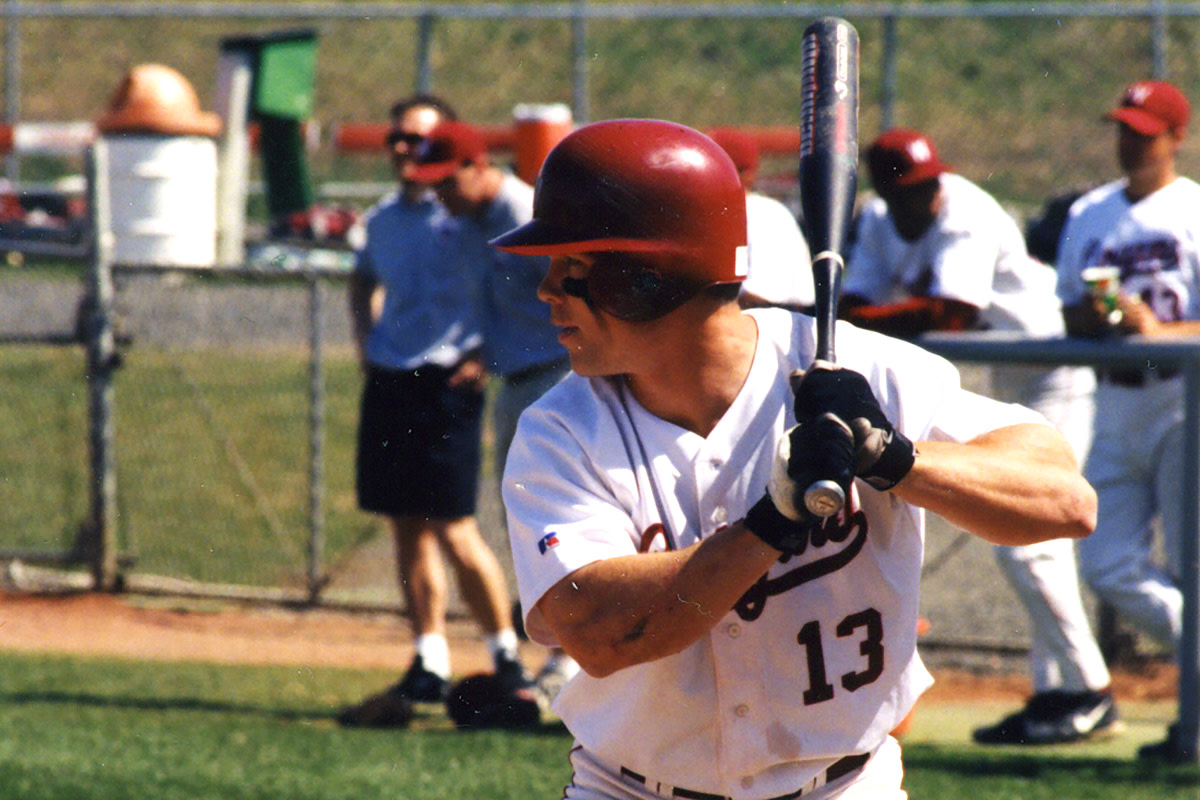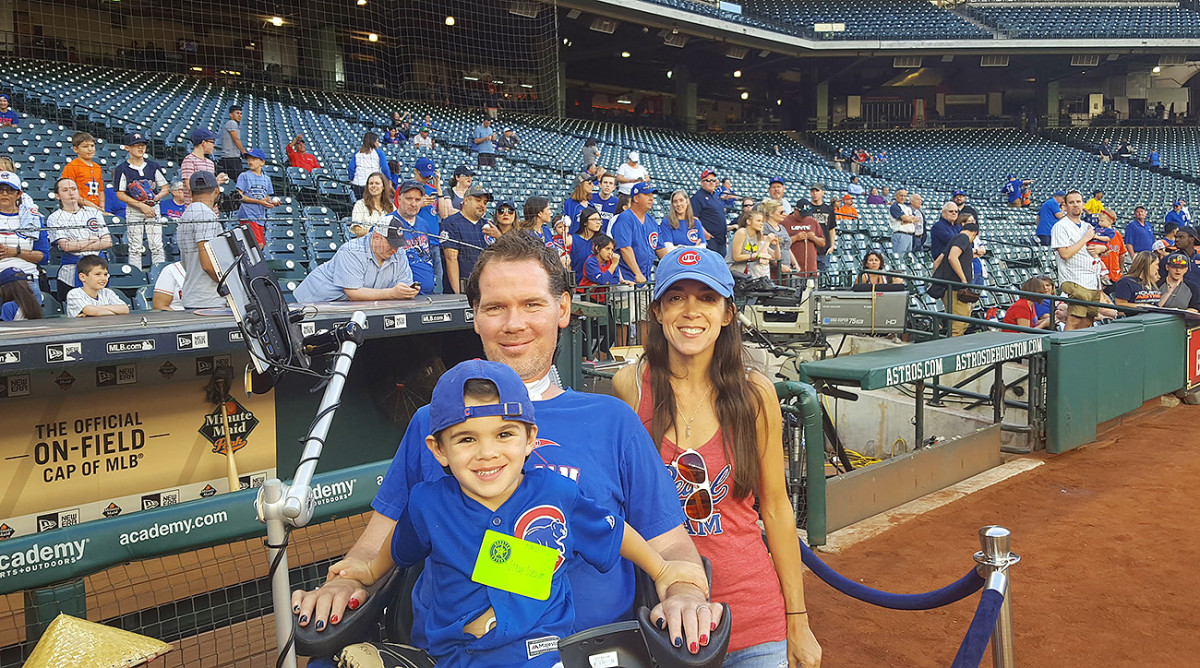Why One Home Run That Barry Zito Gave Up in College Now Stands Above the Rest

It was a frigid Saturday morning on the Washington State University campus in Pullman, Wash. The temperature that day—March 27, 1999—was 28 degrees with a wind chill in the teens, and USC’s baseball team was in town for a three-game series. The first game on Friday night was snowed out, forcing the teams to play a doubleheader on Saturday. WSU coach Steve Farrington instructed the team to arrive early in the morning … to clear the snow off the field in time for the noon start.
Farrington drove his pickup truck onto the field, and the players used shovels to haul the snow off of the infield and into the bed of his truck. When the bed was full, Farrington drove beyond the right-field fence and dumped the snow out. This snow-removal process lasted longer than an hour, all so the Cougers could open their Pac-10 season on time against the perennially powerful Trojans.
“I was a student at Washington State, calling the baseball games on the radio,” says Derek Deis, now a news anchor in nearby Spokane at KXLY TV. “It would be hard to forget that day. We have cold days in late March, and snow, but that day was brutal.”
The teams placed torpedo heaters by their benches, but they did hardly anything to cut the cold. When the Trojans showed up at the field around 10:30 a.m. for the twinbill, the weather was so harsh that most of the players had never dealt with anything like this before. But if USC turned around and went home, the games would still have to be replayed later that season—and the last thing the Trojans wanted was a return trip to this faraway outpost in eastern Washington.
USC’s starting pitcher in the first game was crafty southpaw Barry Zito. In 11 weeks, Barry Zito would be drafted by Oakland as the ninth overall pick in the MLB Draft. In three years, Zito would win the American League Cy Young Award. But today he was just another Trojan wondering why God put him in the tundra.
“All I remember thinking was, ‘What am I doing here?’” Zito said recently—he’s a songwriter living in Nashville now, a world away from his baseball life.
“But I recall that game. I remember it well. I was just talking about the game, in fact. It got really cold in Nashville, and I said it’s nothing like that day I pitched a game and it was 28 degrees with a 10-degree wind chill, something like that. I remember … we went out bought thermals there. I had two sets of thermals on. Imagine pitching with two sets of thermals. Our bus pulled up to the field. It was a little bandbox. And I remember sitting on that bus down the left-field line, trying to prepare self mentally. I remember I pitched pretty well, in spite of the cold. I think we won, like, 2–1.”
“No,” Zito was told. “It was 6–5.”
“Wow,” he said. “I don’t remember giving up that many runs too often that season. But I guess I can see it. That place, seriously, was a total bandbox—small, and the air was so thin there.”
Eighteen years later the memories were coming back to Zito.
“That was a crazy game,” he said. “I actually broke my catcher’s thumb, Eric Munson. He was coming out in the [MLB] draft too, and I was afraid I hurt his chances and he might get picked lower because of that. I threw a fastball, he was expecting a curve. Thank God he was still the third pick.
“But that day was a transformation pitching experience for me. Never before in my life did I pitch in a game where it was below freezing. And never after—not in Detroit or Cleveland, anywhere.”
Washington State’s team, in a show of bravado, played in short sleeves. USC scored twice in the first inning, and WSU got one back in the bottom of the first. The scored stayed that way until the bottom of the fifth, when it started snowing again. There was a 15-minute delay while the snow squall blew over Pullman.
“I think I stayed in the dugout, by the heater,” Zito said. “Most of the guys went on the bus, but I didn’t want to lose focus. I didn’t want to lose my groove. I think I was pitching pretty well.”
In the bottom of the fifth, after the snow stopped, the Cougars’ wiry center-fielder came to the plate to face the wily Zito. A lefty batter, the senior struck out his first time up.
“I do remember giving up a home run that day,” Zito said.
The center-fielder recalls the home run, vaguely. He thinks it was a fastball, “given the wicked nature of Zito’s curve.”
“I do remember contact, and I remember the ball clearing the wall in right-center,” Steve Gleason said.


Zito vaguely recalls the name Steve Gleason, but he does not know the story....
A Saints’ special-teams player, Gleason memorably blocked a punt in New Orleans’s first game after Hurricane Katrina at the Superdome in 2006, morphing into a symbol of the city’s pluck and recovery. Gleason retired from the NFL in 2008 and settled in New Orleans, marrying a local girl, Michel Varisco. But in 2011 he announced that he’d been diagnosed with ALS, a neurological disease currently with no cure. Gleason, a documentary giving a stark and very real examination of life with ALS, was released to critical acclaim in 2016. The disease has robbed him of all ability to move, and he spends his time, mostly, as a national leader in the fight against ALS and the search for a cure—and thanks to technology, Gleason answered the questions for this story by typing with his eyes on the laptop on his mechanized wheelchair.
“That is crazy, man,” Zito said. “I am going to have to learn about Steve.”
“When you’re a college kid, you didn’t know that Barry Zito and Steve Gleason were going to become Barry Zito and Steve Gleason,” says Deis, the play-by-play man and a WSU senior at the time. “But I can tell you, at that time, Steve Gleason was the man on campus. Phenomenal athlete for guy his size. The first game I saw my freshman year, playing Montana, he made a tackle and I thought he killed the guy. That became par for the course with Gleas. He just laid the wood to so many guys. On the baseball field, he played with reckless abandon.’’
At 5' 11" and 210 pounds, Gleason was light for a linebacker, but just right for a center-fielder. But he had a better chance to be a pro linebacker than baseball player, so that’s the direction he took.
“In high school, I planned to play both sports, because I figured that my size would not allow me to be an NFL linebacker,” Gleason typed via his eyes. “I loved baseball. I wouldn’t say that I was obsessed with either sport. I didn’t really watch either sport super closely. The first NFL game I watched live, was the first NFL game I played in.
“As things played out in college, I was just better at football. I figured I would give the NFL a shot, rather than toil in the minor leagues for a few years. Comparing my experience with both sports, the atmosphere, travel logistics, and nature of baseball is so much more fun. Baseball teams are on the road all the time. The goal is to keep things fun and relaxed. Before, during, and after the games the idea is to keep things loose, so guys are always goofing around, making up games, filling time. We’d go on nine-day road trips every year during spring break—Hawaii, California, Texas, Arizona.
“Football is more like a business meeting, or a business trip. Everyone has game plans and binders on the plane. Road trips are typically 36 hours, or less. Before games, guys are trying to get psyched up rather than relax. They’re going to battle. Although I only worked on baseball a few months a year, I think the biggest difference for me is, in football, I felt like I could just out-think, work harder and try harder than the next guy to be successful. In baseball, in many ways, the more you try and the more you think, the worse things go.”
But that day in eastern Washington, this was just another baseball game—in freezing conditions.
“I didn’t realize that Barry was such an elite pitcher, so I guess it wasn’t something that was a big deal,” Gleason typed. “I wasn’t a stats guy—still not—and at that point, I was a senior and understood that football was probably the best chance I had to play professionally. My years in the NFL, I didn’t follow MLB baseball really at all. I had no idea that Barry Zito won the Cy Young, and in fact I didn’t realize that I had hit a home run off him until the WSU play-by-play commentator [Deis] tweeted to me a few years ago.

“After I retired, I caught several Cubs games at Wrigley, but didn’t really get back into baseball until a few years ago when [Steve’s and Michel’s son] Rivers started playing. It’s such a great sport. In fact, Michel and Rivers and I watch maybe 80-100 MLB games a year with the MLB app on Apple TV, and we have season tickets at Tulane, where I got my MBA. Baseball—helping coach Rivers and watching at any level—has been one of the things that has flourished, despite my physical decline from ALS.
“We started a new project last fall, the Gleason Life Skills Sports Clinics. The clinics teach the essential skills to succeed in athletics, but also the essential skills to succeed in life. Our first two clinics have been baseball.”
Zito had no idea why someone wanted to reach him to talk about a college home run he gave up on a 28-degree day in eastern Washington 18 years ago, in a nine-inning complete game, in which he threw 148 pitches and struck out 14. He’s damn proud of the game. But at the end of the conversation, he sounded damn glad he gave up the home run, just because it let him get to know someone in a different, important world.
“Sounds like an incredible man,” Zito said of Gleason. “I want to get familiar with him. What a story.”
